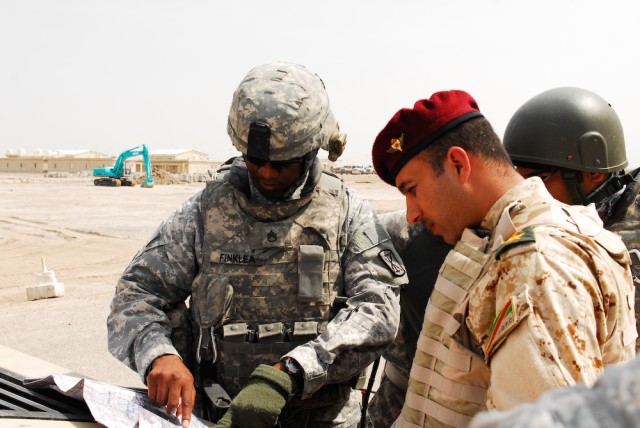Soldiers with 1st Battalion, 377th Field Artillery Regiment, 17th Fires Brigade and the Tactical PSYOP Detachment, 318th Psychological Operations Company, recently conducted one of their routine joint patrols with the Iraqi Army to search out leads on suspicious behavior leading to mortar and rocket attacks in Basra Province.
Reliance on the cooperation from local residents makes their job easier.
"Building relationships in the communities is how we gather intelligence on potential indirect fire attacks," said Sgt. Nicholas Fraley, team leader with the Personal Security Detachment, 1st Bn., 377th FAR. "The more joint patrols we conduct with the Iraqi Security Force, the smaller the window of opportunity for our enemies."
While patrolling a new neighborhood in Jesaizah, Sgt. Evan Whitlock, team leader for the TP Det., 318th, PSYOP Co., and native of Pacific, Mo., spoke with individuals such as tribal leaders about the security of the area and the services provided by the government.
"We are asking these people to report suspicious activity in or around their city," Whitlock said. "We know that we're not going to receive good information if the people behind these attacks are doing more for the area than the government."
Shaykh Hameed Khalaf Al-Darajy, a tribal leader of the Jesaizah district, spoke with Whitlock about the security of his community.
Whitlock said that it is everyone's responsibility to ensure that Basra remains safe, and that turning-in people who are out to cause harm makes it easier for the local government to focus on providing services to the neighborhoods.
"We are deeply concerned about the criminals that cause these attacks. We are concerned with the safety of our families," said Darajy.
Whitlock suggested that the Shaykh work with the local council and bring up their neighborhood concerns to the local government.
"We will place your concerns in our reports as well. We will do what we can to make sure your area receives the services it needs, but we need the area to stay safe so that the government can focus on meeting the needs of these people," Whitlock told Darajy.
Members of the IA and U.S. forces handed out approximately 250 tip cards carrying emergency response contact information that links them directly to the Iraqi Security Forces' call centers.
"Our goal is to make the people of these communities aware that these attacks are on Iraqi infrastructure and slow the growth of their communities," Whitlock said. "Allowing people to commit these crimes is just as bad as committing the crime themselves."




Social Sharing